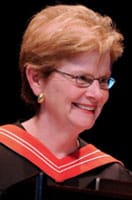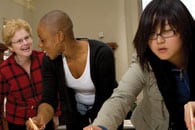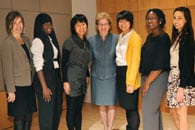Dr. Jane Dammen McAuliffe ’68
Dr. Jane Dammen McAuliffe ’68: An Islamic Scholar Reflects on the Value of Interfaith Dialogues
by Ann Pauley

Dr. Jane Dammen McAuliffe ’68
When Dr. Jane McAuliffe ’68 first learned of the uprisings in Tunisia and then in Egypt, the internationally renowned Islamic scholar reflected on the values of the Muslim faith and the Qur’an that she believes influenced, in part, the Arab Spring. “One of the strongest values that comes to mind is a sense of social unity that Islam as a religious tradition conveys,” she said. “Umma is the Arabic word for the whole body of Muslim people – not divided geographically, not divided nationally, but the entire Muslim community worldwide. There is a strong sense that the umma, the people in their oneness, reflect the oneness of God. That’s a theological statement, but I think it’s also a psychologically significant one. Consequently, there is this desire for unity, for the people to be of one, to be able to express themselves in a way that allows their freedom as Muslims to be recognized. Of course, religion and politics and economics and so many other factors are woven into a whole series of phenomena known as the Arab Spring. This was a popular uprising that was seeking greater freedom in the 21st century where there was a clear witness of the availability of far more freedoms in many other societies.”
She described her reaction to the Arab Spring as one of “enormous surprise. I have talked to many of my fellow Islamic scholars and many of us shared that sense of surprise that this could erupt, particularly in Egypt, where there had been decades and decades of repression and stagnation. To see this outburst of popular sentiment on this scale, to witness that was very exciting, but also very surprising.”
McAuliffe is optimistic about the future for the citizens of those countries where the Arab Spring is still unfolding. “I share the hope of all of us who have benefitted from being citizens of liberal democracies – the hope that some of the benefits of a more democratic political system can eventually be experienced by our brothers and sisters in places where there has been such persistent and prolonged repression.”

McAuliffe shares a light moment with students as they complete a mural for the college.
McAuliffe became the eighth president of Bryn Mawr College in July 2008, after serving nine years as dean of Georgetown College at Georgetown University where she was also a professor in the departments of history and Arabic and Islamic studies. For nearly three decades, she has pursued a scholarly focus on Islam and interfaith dialogues, both of which, she says, have strengthened her own faith.
For McAuliffe, her path to Islamic studies was one of discovery and intellectual curiosity. “I certainly didn’t grow up thinking I would be an Islamic scholar,” she said from her office on Bryn Mawr’s campus. Although she did not begin to explore Islam until graduate school, she believes that, in many ways, her interest was sparked by her academic experiences at Trinity.
“I have to credit Trinity for this path, in that Trinity really deepened my interest in both theology and philosophy,” she said. “I focused on philosophy and classics at Trinity. Two things emerged from that experience. First, a very strong interest in the world of ideas and how those ideas expressed themselves in the theological traditions of, at that point, Christianity. By extension, a curiosity was developing in me about how those same key concepts, with respect to human life and the meaning of human life, expressed themselves in other religious traditions. The curiosity of a comparativist was sparked at Trinity.”
“That was one stream of academic inquiry that eventually fed my interest in Islamic studies,” she continued. “The other stream was classics – the study of such languages as Latin and Greek, which gave me a real appetite for language study.”
After she graduated from Trinity, she pursued graduate studies part-time at Fordham University and Union Theological Seminary. After her first two children were born, she began graduate school full time in 1976 at the University of Toronto with support from a Danforth Foundation Fellowship.
Still, the study of Islam was not yet a part of her scholarly focus. “Initially, I thought I was going to be doing work in the philosophy of religion – the way a comparativist’s curiosity could look at these key questions across a variety of religious traditions,” she said. “I thought I would specialize in the philosophy of other religions, but I knew I had a deficit in any real knowledge of other religious traditions, so some of my initial course work was in such areas as Buddhism and Judaism.”
As part of her exploration of other religious traditions, McAuliffe took a course titled Medieval Islamic Political Philosophy and she was “immediately hooked” and intellectually captivated.
“I saw so many areas of similarity with Christianity and so many areas of difference. There was also something that I have come to call the fascination of the unknown. There was so little taught in my own era in elementary or secondary or even tertiary education, about Islam and non-Western cultures. I knew nothing about this topic,” she recalled. “There was that fascination of diving into something that was completely new to me.” As she began her exploration of Islam, she was very eager to study Arabic and Persian, building on her study of Latin and Greek at Trinity.
“After I took that course, I then stepped back to do foundational work in Islam,” she said. She went on to focus on the historical roots of Islam, the exegesis of the Qur’an, and comparative explorations of Islam and Christianity. She completed her doctorate at the University of Toronto in 1984, writing her dissertation on “Perceptions of the Christians in Qur’anic Tafsir,” which earned her recognition from the Middle East Studies Association for exceptional achievement in research and writing of dissertations.
After serving as associate professor of theology and associate dean at the Candler School of Theology at Emory University, she returned to the University of Toronto, where she became a professor in the department of Near and Middle East civilization, and director of the Centre for the Study of Religion. She became dean at Georgetown University in 1999.
Her scholarly books include the Cambridge Companion to the Qur’an and Qur’anic Christians: An Analysis of Classical and Modern Exegesis, and the forthcoming Norton Anthology of World Religions and Norton Critical Edition of the Qur’an. She is the general editor of the six-volume Encyclopaedia of the Qur’an and is the co-editor of With Reverence for the Word: Medieval Scriptural Exegesis in Judaism, Christianity, and Islam. She has written dozens of book chapters, journal articles and book reviews.
Interfaith Dialogues
From the earliest years of her scholarly journey in Islamic studies at the University of Toronto, McAuliffe has been involved in a variety of interfaith dialogues, which she has found to be intellectually and spiritually rewarding and challenging. In the mid-1980s she served on the board of an interfaith group, Islam-West, and worked with the Christian-Muslim National Liaison Committee of Canada. When she returned to the United States to teach at Emory University, she began to assist the ecumenical and interfaith office of the U.S. Conference of Catholic Bishops. This was followed by a decade-long tenure on the Vatican’s Commission for Religious Relations with Muslims, which she describes as “a group that operated as a kind of think-tank for Roman Catholic outreach to the Muslim world.”
McAuliffe noted that the work of the Vatican’s commission “was an important priority for the Vatican and remains so because the Catholic Church is a worldwide religious community and Christianity and Islam are the two largest worldwide religions, so there are many areas of the world in which Christians and Muslims, Catholics and Muslims, must live with each other and must understand each other.”
The Vatican commission’s roots date back to 1965, when Pope Paul VI proclaimed Nostra Aetate (In Our Age), which McAuliffe describes as “one of the most important documents of the Second Vatican Council.” The Declaration on the Relation of the Church with Non-Christian Religions includes a passage about Islam in which it proclaims that the Catholic Church regards Muslims with esteem and then highlights the commonalities between Islam and Catholicism.
The document calls upon Christians and Muslims to put aside past differences and work together towards “mutual understanding … social justice and moral welfare, as well as peace and freedom.” It also puts forward a call for interfaith dialogue which led to a series of conferences and commissions in Rome and around the world.
“At a distance of almost 50 years, it’s hard to realize what a revolution in Catholic thinking these words and their subsequent implementation constituted,” said McAuliffe in a speech at Union College in 2010. “Yet the ’60s were a decisive decade in so many ways, not least of all in how they shaped the future of interreligious relations.”
In that same speech, she noted that, “Virtually everyone whom I’ve come to know through interfaith engagements has told me that his or her own faith has been strengthened by participation in dialogue meetings. As you try to explain your faith to another and listen to that person’s attempt to do the same, you reengage with you own religious formation, your own spiritual heritage.”
For nearly a decade, McAuliffe has participated in an annual gathering of Muslim and Christian scholars convened by the Archbishop of Canterbury. “The Building Bridges Seminar” was launched as a response to the events of September 11, 2001, and its meetings alternate between Muslim and Western cities and sites. The most recent seminar was convened in April of this year at King’s College in London and focused on “Death, Resurrection and Human Destiny in Christian and Muslim Perspective.”

McAuliffe with the Bryn Mawr College student panel at the National Museum for Jewish History.
“I feel deeply privileged to participate in these interfaith dialogues,” McAuliffe said. “When I am in conversation with sincere believers of another religious tradition, the depth of their faith and their sincerity comes across strongly and is, for me, a subject of deep admiration. I am drawn to people of deep faith. The questions that Muslim scholars put to me as a Christian make me think about my own Christian faith – they make me think through some of the answers that I may not have digested as carefully or as well as I should have. The dialogue forces me to be more articulate about my own religious tradition.”
She continued, “My experiences with Christian-Muslim dialogues, and having many Muslim friends and colleagues, have also made me think about prayer in new ways. Prayer is very important in Islam. When I see devout Muslims absenting themselves from our conversations at specific times of the day to be faithful to their five-fold daily prayer tradition, it is, for me, a very potent reminder of what the importance of prayer should be in my own life. It is a real living witness.”
A Global Agenda for Higher Education
McAuliffe’s commitment to interfaith dialogues parallels her very intentional global agenda as president of Bryn Mawr. She has convened international forums on campus, developed strategic partnerships with colleges and universities around the world, and served on the American Council on Education Blue Ribbon Panel on Global Education and the United Kingdom-U.S. Higher Education Policy Forum.
She also joined several other college and university presidents and foreign relations experts at a “Working Group on Global Issues” meeting co-sponsored by the Council on Foreign Relations, to which she was elected in 2009, and the Forum for the Future of Higher Education. McAuliffe spoke on a panel titled “Globalization and Higher Education: Implications for the Future.”
“Global education is a passion I share with the leadership of much of higher education,” said McAuliffe. “We are all looking at the need to provide a far more global experience for our students. We all know, as parents, as educators, that our children, our graduates, are going to be spending significant portions of their lives working in other parts of the world or working for organizations that are connected globally. So it is simply impossible to graduate in the 21st century and to be adequately educated without a far broader global perspective than was needed two or three decades ago.”
She also believes that as a women’s college, Bryn Mawr can play a key role in global education. “Like Trinity, we were founded because we could be a place where, through education, we could empower women to operate for the betterment of their societies in ways that would be impossible if they were not educationally equipped to do so,” she said. “We were institutions that were offering access to education to women. This focus on training women who in turn could be change agents for their society is very deep in our institutional DNA at Bryn Mawr. I see a very pressing need for us to continue to do that, but on a much broader footprint. The work of women’s advancement is not done. Our work as educational institutions that are all about the advancement of women must address the fact that the work of the advancement of women remains undone in this country, and certainly remains undone in vast parts of the world. I want to educate a generation of graduates of this institution who are keenly aware of that and who are prepared in whatever field of work they go into to do whatever they can to push an agenda of women’s equity forward. That’s what we’re all about.”
She added, “Women’s participation in public service does not equal that of men. Why can’t we work together towards moving that needle?”
This brings the conversation full circle to the Arab Spring and the role of women in particular. “While the Arab Spring has opened up many possibilities, one key area that I am concerned about is the rights of women,” said McAuliffe. “Certainly the regimes in Egypt and Tunisia and other countries were very repressive. However, they were able to pass legislation, particularly in Tunisia, that, in many ways, was far more favorable to women, than had been the case previously. I fear the rollback of the good things, at least legally, that were done for women under these nationalist regimes.”
Yet McAuliffe remains optimistic. “One of the things that gives me hope is the fact that the proportion of women in the Middle East and North Africa who are now university educated is far, far higher than it was even a few decades ago. Unfortunately, that has not translated into viable employment; women run into cultural barriers when seeking post-graduation employment. Nevertheless, we’re dealing with a much more educated female base and that gives me great hope.”